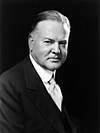Herbert Hoover Jr.
Herbert Hoover Jr. | |
|---|---|
 | |
| 19th United States Under Secretary of State | |
| In office October 4, 1954 – February 5, 1957 | |
| President | Dwight D. Eisenhower |
| Preceded by | Walter B. Smith |
| Succeeded by | Christian Herter |
| Personal details | |
| Born | Herbert Charles Hoover August 4, 1903 London, England |
| Died | July 9, 1969 (aged 65) Pasadena, California, U.S. |
| Political party | Republican |
| Spouse |
Margaret Eva Watson (m. 1925) |
| Children | 3 |
| Parents | |
| Relatives | Allan Hoover (brother) |
| Education | |
Herbert Charles Hoover (August 4, 1903 – July 9, 1969), better known as Herbert Hoover Jr., was a British-born American engineer, businessman, and politician who served as United States
Biography

Early years, 1903–1928
Herbert Charles Hoover was born in London on August 4, 1903. He was the elder son of President
Aviation radio, 1928–1930

In 1928, Herbert Jr was hired by
Geophysical engineer and adviser to foreign governments, 1930–1953
Hoover did not stay at Western Air Express, however. During the 1930 election, there were rumors that Western Air Express had only won certain government contracts because of Hoover's status as the president's son, and saying that Hoover's advancement owed more to his famous name than his talent. Hoover submitted a letter of resignation in response to the allegations.
Hoover's interest in radio next turned him to the field of exploration geophysics, and the use of radio to prospect for oil.[9] He founded United Geophysical, headquartered in Pasadena, California, in 1935 and by 1939 he had 200 employees working in five labs perfecting the art of exploring for oil by seismological means.[9] In 1937, he founded a related company, Consolidated Engineering Corporation, which focused on instrument manufacturing.[10]
Hoover's
In 1943, President of Venezuela Isaías Medina Angarita invited Hoover to advise the Venezuelan government in the negotiation of oil contracts with foreign governments.[10] While there, Hoover oversaw a substantial rewriting of Venezuela's oil laws, which would provide a model for other countries in the years to come.[10]
In 1944, the new
United Geophysical was later bought by
Special Envoy, 1953–1954
In the wake of the
Under Secretary of State, 1954–1957
Eisenhower was impressed by Hoover's performance as well.
Amateur radio
Hoover was an amateur radio operator holding the call W6ZH. He was elected as President of the American Radio Relay League in 1962; the primary representative organization of amateur radio operators to the U.S. government.
Death
Hoover died at Huntington Memorial Hospital in Pasadena on July 9, 1969. He had suffered a sudden stroke three days earlier on July 6 and never regained consciousness.[15][16]
Family
Herbert Charles Hoover married Margaret Eva Watson in 1925. They had three children: Margaret Ann Hoover Brigham (March 17, 1926 – February 14, 2011), Herbert "Pete" Hoover III (November 5, 1927– February 4, 2010), and Joan Leslie Hoover (April 12, 1930 – May 10, 2002).[16]
References
- ^ Lawrence Kestenbaum. "The Political Graveyard: Index to Politicians: Hoopes to Hopkin". politicalgraveyard.com.
- ^ Hart, Craig (2004). A genealogy of the wives of the American presidents and their first two generations of descent. North Carolina, Jefferson: McFarland & Co., Inc., p. 129
- ^ Nash, George H. The Life of Herbert Hoover: The Engineer, 1874–1920 (New York: Norton, 1983), page 673.
- ^ Cameron Hawley, "The Honored Name I Bear?", Life, Oct 11, 1954
- ^ a b c d Cameron Hawley, "The Honored Name I Bear?", Life, Oct 11, 1954.
- ^ a b c d "The Administration: Hoover to Smith", Time, Aug. 30, 1954.
- ^ "HOOVER, Jr. HONORED". The Oregon Statesman (Newspaper). 6 March 1928. p. 2.
- ^ a b c d e f g h i "Aeronautics: Aeronautical Radio Inc.", Time, July 14, 1930.
- ^ a b "Science: Prospector's Son", Time, Jul. 10, 1939.
- ^ a b c d Cameron Hawley, "The Honored Name I Bear?", Life, Oct 11, 1954, p. 182.
- ^ a b "Oil: Missions to Tehran", Time, Oct. 23, 1944.
- ^ "Office of the Historian - Foreign Relations of the United States, 1952 - 1954", Time, Nov. 19, 1956.
- ^ "Dwight D. Eisenhower: Letter to Herbert Hoover Jr., on His Contribution to the Settlement of the Anglo-Iranian Oil Dispute". ucsb.edu.
- ^ a b c "The Administration: Keeping the Shop", Time, Nov. 19, 1956.
- ^ "Herbert Hoover Jr. Dies at Age of 65". The Desert Sun. Palm Springs CA. 10 July 1969. p. 2. Retrieved 20 March 2019.
- ^ a b "Herbert Hoover, Jr". Herbert Hoover National Historic Site. National Park Service. 25 October 2018. Retrieved 20 March 2019.



